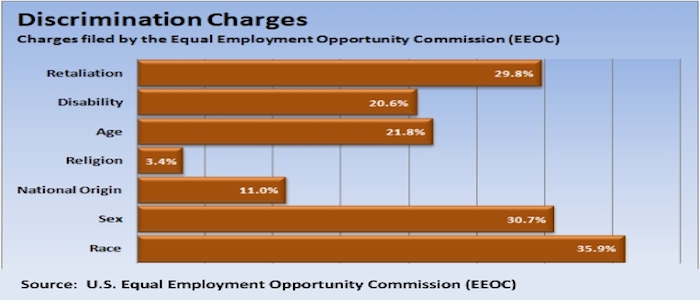You could say 2013 was a very good year for the Equal Employment Opportunity Commission.
Its enforcement collections for victims of workplace discrimination totaled $372.1 million for Fiscal Year 2013, an all-time high for the record books. Altogether, the agency’s FY 2013 Performance and Accountability Report makes for some fascinating reading.
Despite the fact that the total number of claims was down from the three previous years and there were fewer resolutions, agency lawyers were able to squeeze more money out of each claim that did settle. The agency also reports it has reduced its total claim processing time by 21 days, so it now takes an average of 261 days for a claim to make its way through to final resolution.
EEOC now focusing on smaller employers
The final thing worth noting in the report – and about which small employers should take heed – is the EEOC’s affirmation of its new strategic direction, which aims less at very large employers in favor of going after the little guys – and by that we mean, potentially, YOUR company.
In reviewing the agency’s FY 2013 results, it confirms the general impression among employers nationwide that the EEOC is getting mighty aggressive in pursuing discrimination claims wherever they appear. Its approach has been to “sue first, and sort out later.”
 Without meaning to diminish the value to society and individuals of preventing workplace discrimination, it makes me nervous when an agency such as this starts feeling its oats and flexing its muscles.
Without meaning to diminish the value to society and individuals of preventing workplace discrimination, it makes me nervous when an agency such as this starts feeling its oats and flexing its muscles.
The whole issue of criminal background checks shows how far their reach can go with this new air of confidence.
States are pushing back
Recently, the EEOC restated its previous guidance on hiring individuals with criminal records, limiting the use of criminal background check information in hiring for private and public sector employers. This didn’t sit well with state governments.
Nine state attorneys general wrote a complaint to the EEOC, and the State of Texas filed suit against them. Texas says the EEOC’s actions requires employers in the state to hire felons, and tramples on the state’s sovereign right to determine eligibility for critical state hires such as teachers, law enforcement officers and those who work with the elderly.
The EEOC did not dramatically change its guidance other than add emphasis; the real change is in enforcement activity.
Can you withstand an EEOC audit?
Here at GeniusHR, we’ve had a little research project going that involved looking at EEOC enforcement patterns. There appear to be significant differences in enforcement priorities based on the types of actions reported by the EEOC at the local office level.
These patterns may see changes based on the Strategic Enforcement Plan for FY 2013-2016. The ongoing effects of the Plan and Guidance can be seen in Office of Federal Contract Compliance Programs directive, DIR 2013-02, which incorporates the EEOC guidance and gives new direction to employment offices and employers.
Employers of any size and level should review the EEOC Guidance and Strategic Plan looking at its effects on their operations, and make sure they can withstand an audit.
This originally appeared on the GeniusHR blog.
